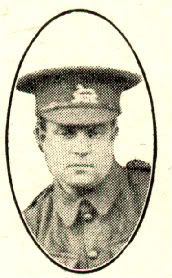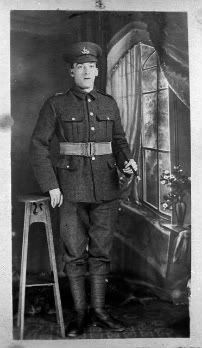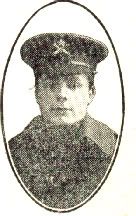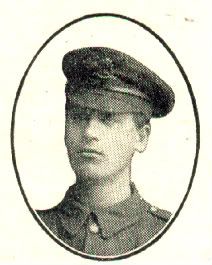We will Remember
Having been out most of the day I was going to put up a post for today but others have put up such lovely epitaphs to our gallant soldiers that instead, I thought I would simply put up a few testimonials for some of the men on our village war memorial who lost their lives in the Great War.
Lance Corporal WILLIAM EDWARD BAILEY
19th Middlesex Regiment
He was killed in action in Belgium on 10th March 1917 aged 33. He died instantly, whilst working in the trenches. A shell burst some distance away sending a flying splinter, which caught him in the shoulder. In a letter home to his wife, Captain Hill stated that he was,
'a very good fellow for work who was trustworthy and one of the few NCOs that he could afford to lose'
Corporal ROBERT LOMAS INSLEY
1st Northumberland Fusiliers
He was initially reported missing on 8 November 1914 during the First Battle of Ypres in an action that cost his battalion a total of 63 officers and men. It was reported that he had been wounded in the back and whilst the wound was being dressed, the Germans opened a heavy shellfire and he was left in the trench never to be seen again. He was 28 years old. In what may well have been his last letter home, he poignantly described conditions in the trenches as follows.
Three hundred yards in front of us there is a trench of Germans and shells keep whistling over us. We have had very few killed and wounded considering we are so close. We do not get much sleep. We are on duty day and night and we have to steal a couple of hours sleep when we can. We have to be tired out before we can sleep with such noise from the big guns and rifle fire.
Private FRANK OAKLEY
58th Company Machine Gun Corps (Infantry)

He died from the results of gas poisoning on 2nd August 1917 aged 42 and was awarded the Military Medal. His Commanding Officer wrote of him.
By his death we have lost a very efficient and stout-hearted soldier and he is mourned alike by officers and men
Private ALBERT SMITH
1st Worcestershire

He went to France on 2nd June 1917 and met his death near Ypres on 28th December 1917 aged 24 whilst carrying out an officer who had been wounded. A machine gun bullet struck him on the head and wounded the officer again. He was described as a,
brave fellow and very popular among his platoon, always helping them as a stretcher-bearer
Sergeant CHARLES VICTOR STAPLES
Machine Gun Corps (Infantry)

He was killed on 16 August 1917, aged 20 during the Battle of Langemarck. He and his fellow men were already exhausted from thirteen days on the front line and the triumph of the battle of Messines. The units were, however, very depleted and the men were mown down to be buried where they fell. Just before his death he received a parchment from the Commanding Officer of the Irish Brigade in recognition of his gallant conduct and constant devotion to duty in the field during 1916. His name and deed was to be entered in the record of the Irish Division and he had been strongly recommended by his Commanding Officer a Military Medal. Unfortunately his untimely death preventing the commendation from taking effect. He was described by his commanding officer as,
One of the best and most fearless of men. He was my right-hand man in all things out here, both in the trenches and at rest. Always most cheerful and bright, even in the most adverse moments. He was most beloved by all who came in contact with him. His place in this section will be very hard to follow
Lance Corporal JACK THOMPSON
D Company, 1/6 Battalion, Prince of Wales, North Staffordshire

Jack was killed by a German sniper on May 1917 aged 23 whilst bombing the enemy out of their trenches during an attack at Nash Alley near Arras in an action that cost the battalion 26 officers and men. In a letter home, his brother William wrote,
Jack and his two fellow Lance Corporals were three of the bravest chaps that ever put foot in the trench. The three killed 22 Germans and in their excitement, chased the enemy over the top little thinking of the great risk they were taking. One chap who was very badly wounded but got back all right told me that Jack and his pals were lying on the top throwing bombs and grenades when a German sniper shot the three of them.
Jack's captain wrote to his parents that,
He was a splendid fellow and of great assistance to me on numerous occasions owing to the knowledge which his wide experience had given him. I shall miss him very much indeed for he was a splendid example to his men. Even in sorrow you have every reason for pride that your son was such a good soldier and that he died nobly.
Lance Corporal WILLIAM EDWARD BAILEY
19th Middlesex Regiment
He was killed in action in Belgium on 10th March 1917 aged 33. He died instantly, whilst working in the trenches. A shell burst some distance away sending a flying splinter, which caught him in the shoulder. In a letter home to his wife, Captain Hill stated that he was,
'a very good fellow for work who was trustworthy and one of the few NCOs that he could afford to lose'
Corporal ROBERT LOMAS INSLEY
1st Northumberland Fusiliers
He was initially reported missing on 8 November 1914 during the First Battle of Ypres in an action that cost his battalion a total of 63 officers and men. It was reported that he had been wounded in the back and whilst the wound was being dressed, the Germans opened a heavy shellfire and he was left in the trench never to be seen again. He was 28 years old. In what may well have been his last letter home, he poignantly described conditions in the trenches as follows.
Three hundred yards in front of us there is a trench of Germans and shells keep whistling over us. We have had very few killed and wounded considering we are so close. We do not get much sleep. We are on duty day and night and we have to steal a couple of hours sleep when we can. We have to be tired out before we can sleep with such noise from the big guns and rifle fire.
Private FRANK OAKLEY
58th Company Machine Gun Corps (Infantry)

He died from the results of gas poisoning on 2nd August 1917 aged 42 and was awarded the Military Medal. His Commanding Officer wrote of him.
By his death we have lost a very efficient and stout-hearted soldier and he is mourned alike by officers and men
Private ALBERT SMITH
1st Worcestershire

He went to France on 2nd June 1917 and met his death near Ypres on 28th December 1917 aged 24 whilst carrying out an officer who had been wounded. A machine gun bullet struck him on the head and wounded the officer again. He was described as a,
brave fellow and very popular among his platoon, always helping them as a stretcher-bearer
Sergeant CHARLES VICTOR STAPLES
Machine Gun Corps (Infantry)

He was killed on 16 August 1917, aged 20 during the Battle of Langemarck. He and his fellow men were already exhausted from thirteen days on the front line and the triumph of the battle of Messines. The units were, however, very depleted and the men were mown down to be buried where they fell. Just before his death he received a parchment from the Commanding Officer of the Irish Brigade in recognition of his gallant conduct and constant devotion to duty in the field during 1916. His name and deed was to be entered in the record of the Irish Division and he had been strongly recommended by his Commanding Officer a Military Medal. Unfortunately his untimely death preventing the commendation from taking effect. He was described by his commanding officer as,
One of the best and most fearless of men. He was my right-hand man in all things out here, both in the trenches and at rest. Always most cheerful and bright, even in the most adverse moments. He was most beloved by all who came in contact with him. His place in this section will be very hard to follow
Lance Corporal JACK THOMPSON
D Company, 1/6 Battalion, Prince of Wales, North Staffordshire

Jack was killed by a German sniper on May 1917 aged 23 whilst bombing the enemy out of their trenches during an attack at Nash Alley near Arras in an action that cost the battalion 26 officers and men. In a letter home, his brother William wrote,
Jack and his two fellow Lance Corporals were three of the bravest chaps that ever put foot in the trench. The three killed 22 Germans and in their excitement, chased the enemy over the top little thinking of the great risk they were taking. One chap who was very badly wounded but got back all right told me that Jack and his pals were lying on the top throwing bombs and grenades when a German sniper shot the three of them.
Jack's captain wrote to his parents that,
He was a splendid fellow and of great assistance to me on numerous occasions owing to the knowledge which his wide experience had given him. I shall miss him very much indeed for he was a splendid example to his men. Even in sorrow you have every reason for pride that your son was such a good soldier and that he died nobly.